Optimizing LLM Workflows Using DSPy and Weave
The BIG-bench (Beyond the Imitation Game Benchmark) is a collaborative benchmark intended to probe large language models and extrapolate their future capabilities consisting of more than 200 tasks. The BIG-Bench Hard (BBH) is a suite of 23 most challenging BIG-Bench tasks that can be quite difficult to be solved using the current generation of language models.
This tutorial demonstrates how we can improve the performance of our LLM workflow implemented on the causal judgement task from the BIG-bench Hard benchmark and evaluate our prompting strategies. We will use DSPy for implementing our LLM workflow and optimizing our prompting strategy. We will also use Weave to track our LLM workflow and evaluate our prompting strategies.
Installing the Dependencies
We need the following libraries for this tutorial:
- DSPy for building the LLM workflow and optimizing it.
- Weave to track our LLM workflow and evaluate our prompting strategies.
- datasets to access the Big-Bench Hard dataset from HuggingFace Hub.
!pip install -qU dspy-ai weave datasets
Since we'll be using OpenAI API as the LLM Vendor, we will also need an OpenAI API key. You can sign up on the OpenAI platform to get your own API key.
import os
from getpass import getpass
api_key = getpass("Enter you OpenAI API key: ")
os.environ["OPENAI_API_KEY"] = api_key
Enable Tracking using Weave
Weave is currently integrated with DSPy, and including weave.init at the start of our code lets us automatically trace our DSPy functions which can be explored in the Weave UI. Check out the Weave integration docs for DSPy to learn more.
import weave
weave.init(project_name="dspy-bigbench-hard")
In this tutorial, we use a metadata class inherited from weave.Object to manage our metadata.
class Metadata(weave.Object):
dataset_address: str = "maveriq/bigbenchhard"
big_bench_hard_task: str = "causal_judgement"
num_train_examples: int = 50
openai_model: str = "gpt-3.5-turbo"
openai_max_tokens: int = 2048
max_bootstrapped_demos: int = 8
max_labeled_demos: int = 8
metadata = Metadata()
The Metadata objects are automatically versioned and traced when functions consuming them are traced
Load the BIG-Bench Hard Dataset
We will load this dataset from HuggingFace Hub, split into training and validation sets, and publish them on Weave, this will let us version the datasets, and also use weave.Evaluation to evaluate our prompting strategy.
import dspy
from datasets import load_dataset
@weave.op()
def get_dataset(metadata: Metadata):
# load the BIG-Bench Hard dataset corresponding to the task from Huggingface Hug
dataset = load_dataset(metadata.dataset_address, metadata.big_bench_hard_task)[
"train"
]
# create the training and validation datasets
rows = [{"question": data["input"], "answer": data["target"]} for data in dataset]
train_rows = rows[0 : metadata.num_train_examples]
val_rows = rows[metadata.num_train_examples :]
# create the training and validation examples consisting of `dspy.Example` objects
dspy_train_examples = [
dspy.Example(row).with_inputs("question") for row in train_rows
]
dspy_val_examples = [dspy.Example(row).with_inputs("question") for row in val_rows]
# publish the datasets to the Weave, this would let us version the data and use for evaluation
weave.publish(
weave.Dataset(
name=f"bigbenchhard_{metadata.big_bench_hard_task}_train", rows=train_rows
)
)
weave.publish(
weave.Dataset(
name=f"bigbenchhard_{metadata.big_bench_hard_task}_val", rows=val_rows
)
)
return dspy_train_examples, dspy_val_examples
dspy_train_examples, dspy_val_examples = get_dataset(metadata)
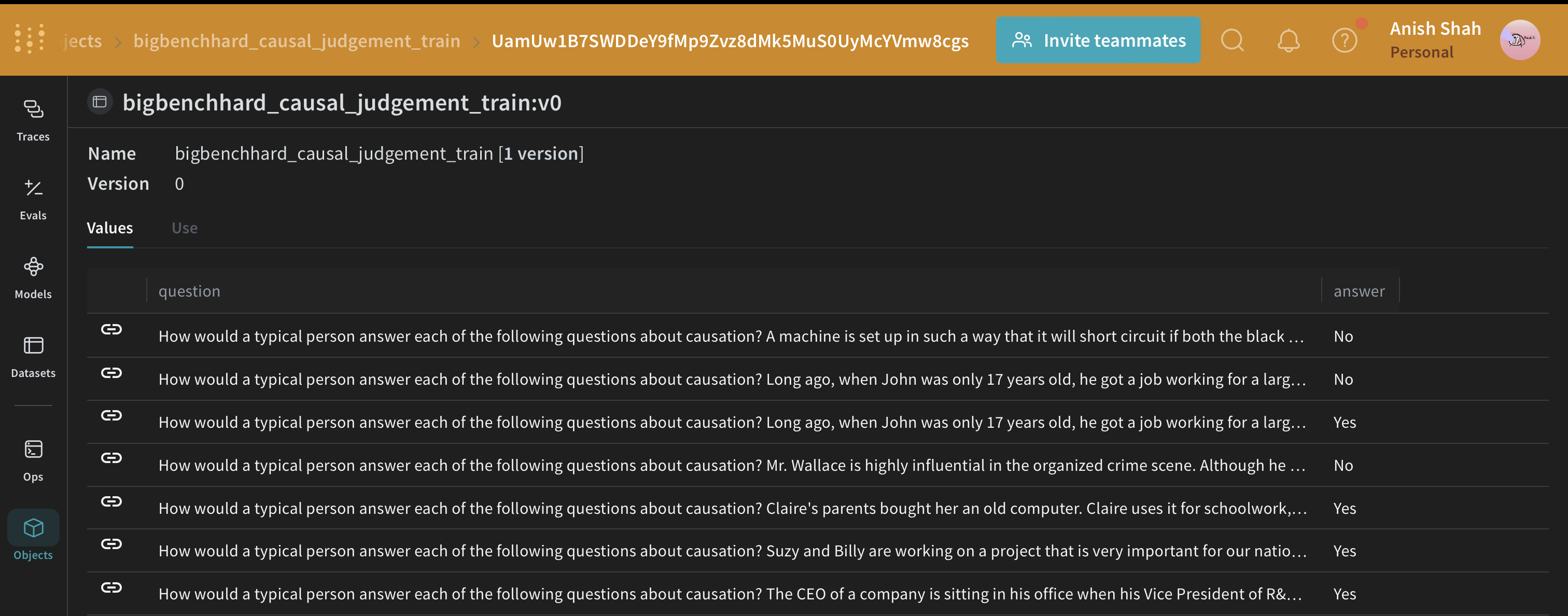
The DSPy Program
DSPy is a framework that pushes building new LM pipelines away from manipulating free-form strings and closer to programming (composing modular operators to build text transformation graphs) where a compiler automatically generates optimized LM invocation strategies and prompts from a program.
We will use the dspy.OpenAI abstraction to make LLM calls to GPT3.5 Turbo.
system_prompt = """
You are an expert in the field of causal reasoning. You are to analyze the a given question carefully and answer in `Yes` or `No`.
You should also provide a detailed explanation justifying your answer.
"""
llm = dspy.OpenAI(model="gpt-3.5-turbo", system_prompt=system_prompt)
dspy.settings.configure(lm=llm)
Writing the Causal Reasoning Signature
A signature is a declarative specification of input/output behavior of a DSPy module which are task-adaptive components—akin to neural network layers—that abstract any particular text transformation.
from pydantic import BaseModel, Field
class Input(BaseModel):
query: str = Field(description="The question to be answered")
class Output(BaseModel):
answer: str = Field(description="The answer for the question")
confidence: float = Field(
ge=0, le=1, description="The confidence score for the answer"
)
explanation: str = Field(description="The explanation for the answer")
class QuestionAnswerSignature(dspy.Signature):
input: Input = dspy.InputField()
output: Output = dspy.OutputField()
class CausalReasoningModule(dspy.Module):
def __init__(self):
self.prog = dspy.TypedPredictor(QuestionAnswerSignature)
@weave.op()
def forward(self, question) -> dict:
return self.prog(input=Input(query=question)).output.dict()
Let's test our LLM workflow, i.e., the CausalReasoningModule on an example from the causal reasoning subset of Big-Bench Hard.
import rich
baseline_module = CausalReasoningModule()
prediction = baseline_module(dspy_train_examples[0]["question"])
rich.print(prediction)
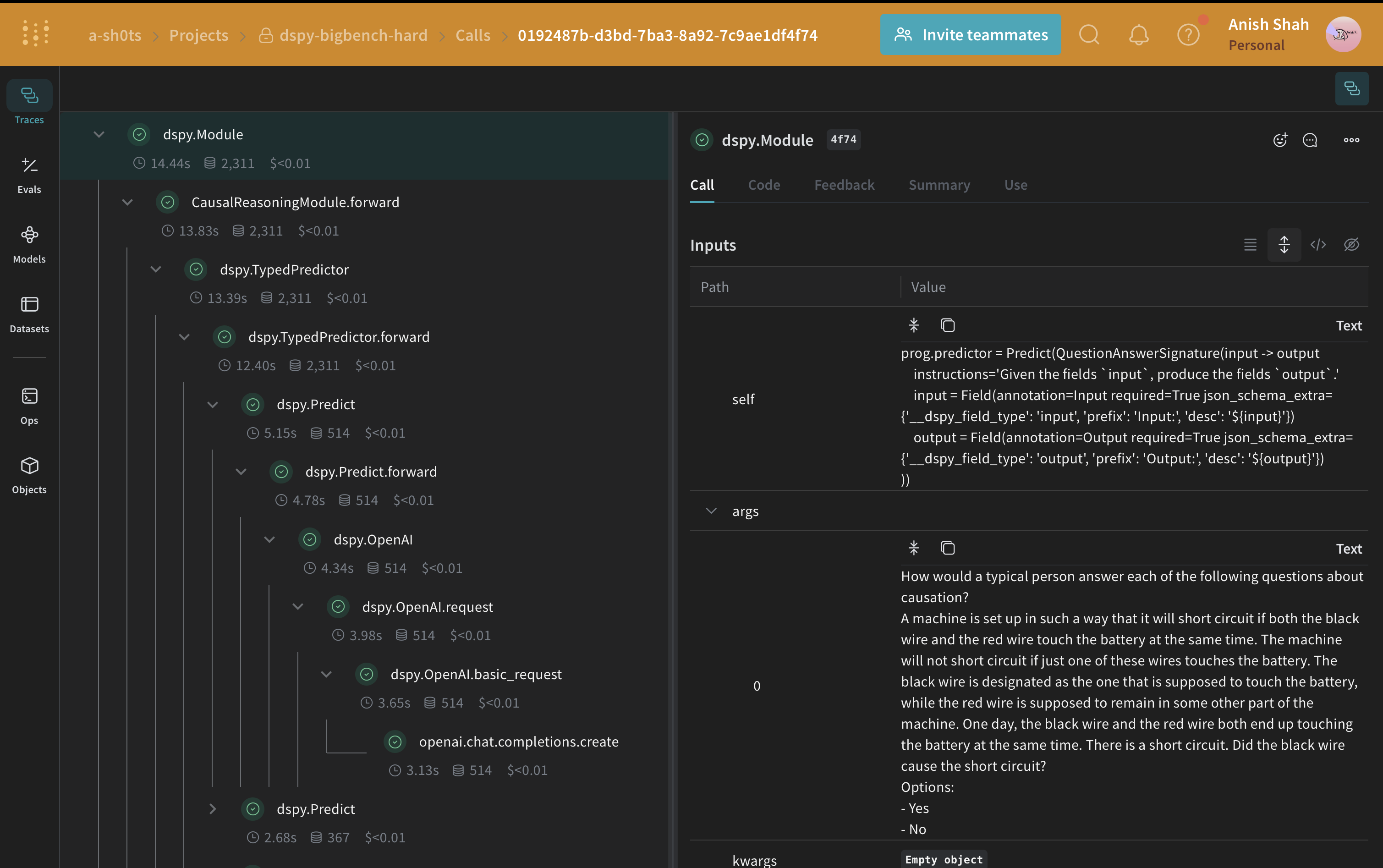
Evaluating our DSPy Program
Now that we have a baseline prompting strategy, let's evaluate it on our validation set using weave.Evaluation on a simple metric that matches the predicted answer with the ground truth. Weave will take each example, pass it through your application and score the output on multiple custom scoring functions. By doing this, you'll have a view of the performance of your application, and a rich UI to drill into individual outputs and scores.
First, we need to create a simple weave evaluation scoring function that tells whether the answer from the baseline module's output is the same as the ground truth answer or not. Scoring functions need to have a model_output keyword argument, but the other arguments are user defined and are taken from the dataset examples. It will only take the necessary keys by using a dictionary key based on the argument name.
@weave.op()
def weave_evaluation_scorer(answer: str, output: Output) -> dict:
return {"match": int(answer.lower() == output["answer"].lower())}
Next, we can simply define the evaluation and run it.
validation_dataset = weave.ref(
f"bigbenchhard_{metadata.big_bench_hard_task}_val:v0"
).get()
evaluation = weave.Evaluation(
name="baseline_causal_reasoning_module",
dataset=validation_dataset,
scorers=[weave_evaluation_scorer],
)
await evaluation.evaluate(baseline_module.forward)
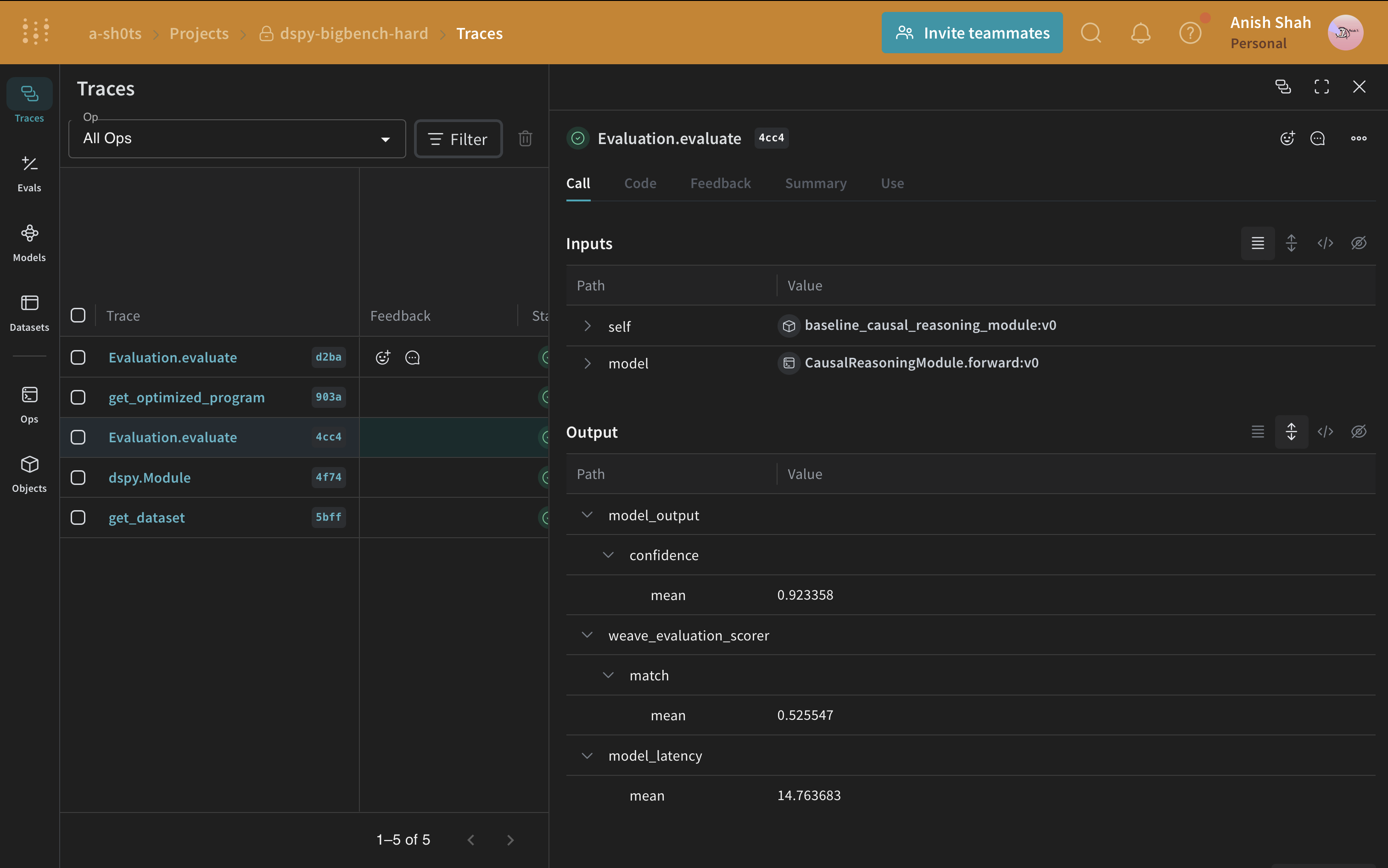
If you're running from a python script, you can use the following code to run the evaluation:
import asyncio
asyncio.run(evaluation.evaluate(baseline_module.forward))
Running the evaluation causal reasoning dataset will cost approximately $0.24 in OpenAI credits.
Optimizing our DSPy Program
Now, that we have a baseline DSPy program, let us try to improve its performance for causal reasoning using a DSPy teleprompter that can tune the parameters of a DSPy program to maximize the specified metrics. In this tutorial, we use the BootstrapFewShot teleprompter.
from dspy.teleprompt import BootstrapFewShot
@weave.op()
def get_optimized_program(model: dspy.Module, metadata: Metadata) -> dspy.Module:
@weave.op()
def dspy_evaluation_metric(true, prediction, trace=None):
return prediction["answer"].lower() == true.answer.lower()
teleprompter = BootstrapFewShot(
metric=dspy_evaluation_metric,
max_bootstrapped_demos=metadata.max_bootstrapped_demos,
max_labeled_demos=metadata.max_labeled_demos,
)
return teleprompter.compile(model, trainset=dspy_train_examples)
optimized_module = get_optimized_program(baseline_module, metadata)
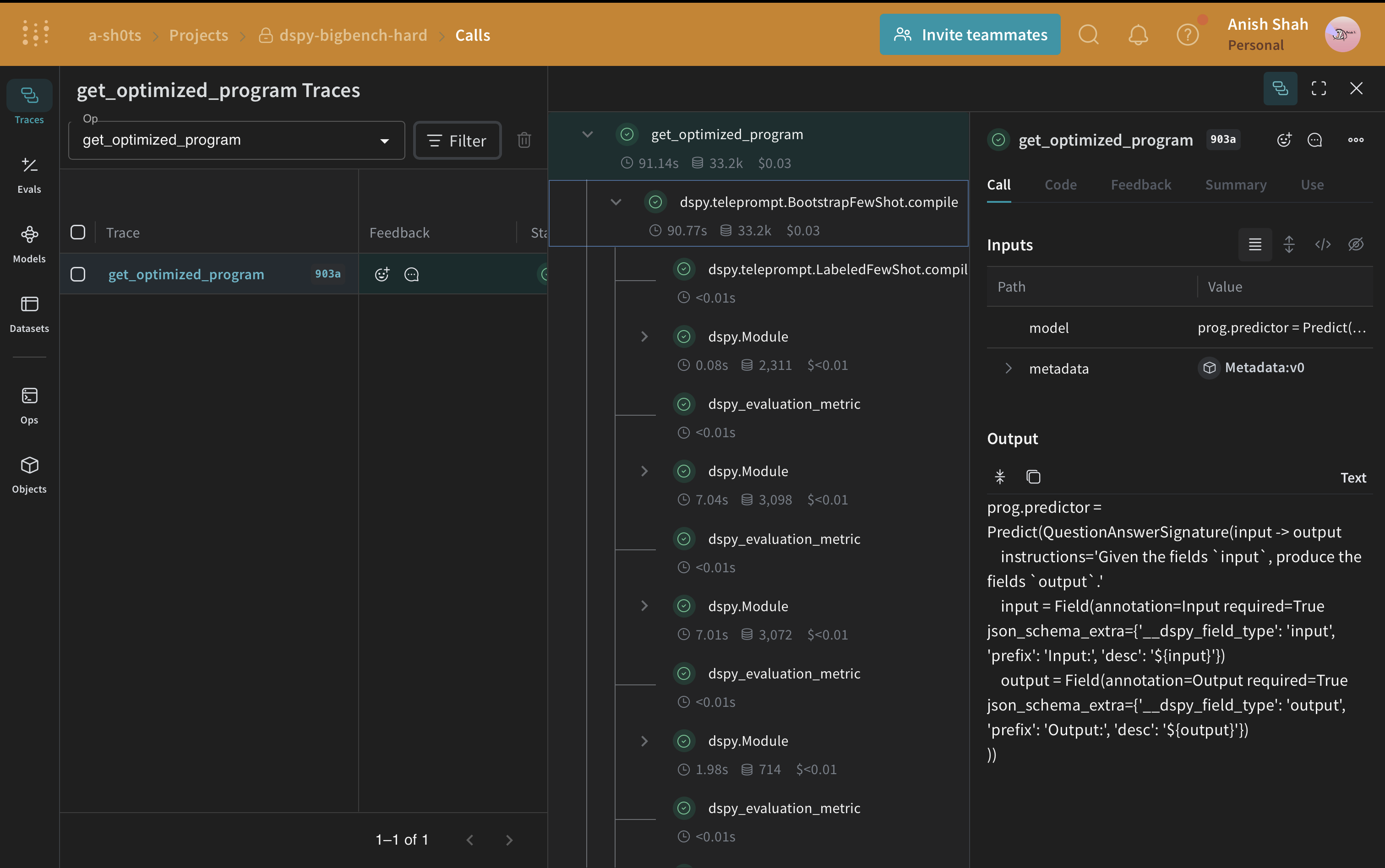
Running the evaluation causal reasoning dataset will cost approximately $0.04 in OpenAI credits.
Now that we have our optimized program (the optimized prompting strategy), let's evaluate it once again on our validation set and compare it with our baseline DSPy program.
evaluation = weave.Evaluation(
name="optimized_causal_reasoning_module",
dataset=validation_dataset,
scorers=[weave_evaluation_scorer],
)
await evaluation.evaluate(optimized_module.forward)
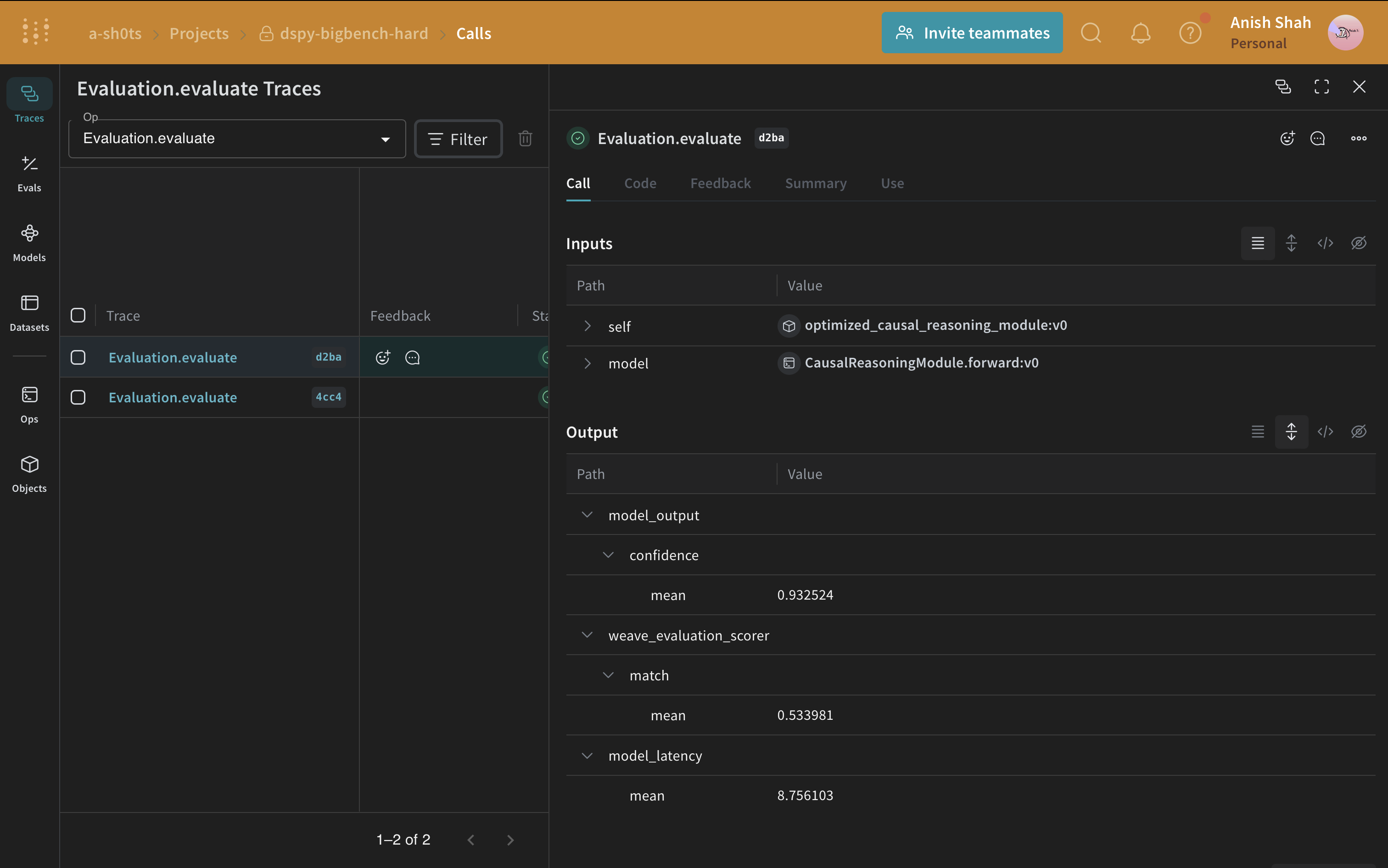
When coomparing the evalution of the baseline program with the optimized one shows that the optimized program answers the causal reasoning questions with siginificantly more accuracy.
Conclusion
In this tutorial, we learned how to use DSPy for prompt optimization alongside using Weave for tracking and evaluation to compare the original and optimized programs.